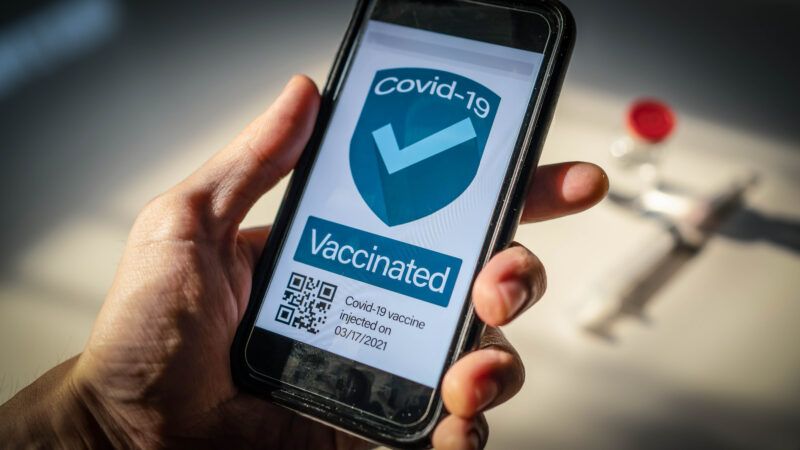In a Rush To Ban Vaccine Passports, Texas Is Violating Private Property Rights
Texas Gov. Greg Abbott says he stands for freedom. That doesn't apply to business owners.

Texas Gov. Greg Abbott has positioned himself as more than a Republican, but as a true conservative. It was with that framing that the leader of the Lone Star State signed a law to ban private businesses from setting their own terms of service when it comes to helping customers.
"Texas is open 100 percent," Abbott said in a clip posted to Twitter. "And we want to make sure that you have the freedom to go where you want without limits."
He will not extend that same freedom of association to individual actors who have their own enterprises. "The Texas legislature passed a law that I am about to sign that prohibits vaccine passports in Texas," he added. "No business or government entity can require a person to provide a vaccine passport, or any other vaccine information, as a condition of receiving any service, or entering any place."
Abbott's got part of it right. He's also gotten a major part wrong.
The notion that no "government entity" should demand a vaccine passport makes fine sense. The state has a monopoly on power, and necessitating proof of vaccination would amount to forced inoculation. In March, reports circulated that President Joe Biden's administration was collaborating with private companies to implement vaccine passports—a sketchy way of couching the requirement outside of the public sector. He abandoned that plan shortly thereafter, citing privacy rights.
Such pieces of legislation are typically pushed by left-leaning types—the same people who would, in virtually every other circumstance, back the "my body, my choice" mantra. The hypocrisy is staggering.
Abbott is not immune from that hypocrisy. Core to the conservative creed is the idea that private businesses are not held to the same rules as the government, in that they are allowed to set their own policies and operate within their own values. It's also core to the U.S. Constitution.
The Texas bill "violates private property rights," says Timothy Sandefur, vice president for litigation at the Goldwater Institute. "The longstanding legal tradition has always been that businesses owe an obligation to protect their customers' safety, at least to some basic extent, and this law comes along and says, not only are they not free to make that choice, but they're prohibited from doing so."
The legislation uses several different state levers to strong-arm businesses into compliance. It weaponizes governmental occupational licensing requirements—something Abbott has rightly railed against in other contexts—and threatens to withhold "a license, permit, or other state authorization necessary for conducting business in this state" should a company run afoul of the law.
Perhaps more notably, it also precludes any entity that disobeys from "receiv[ing] a grant or enter[ing] into a contract payable with state funds."
Yet it was Abbott who applied the exact opposite justification when he (again, rightly) signed a law that allowed taxpayer-funded faith-based adoption agencies to operate within their belief systems when pairing children with prospective parents. The difference here: One comports with his personal values, and the other—vaccine verification—does not.
Similarly, there was the kerfuffle around Hobby Lobby, the company that in 2012 sought to exempt itself from Obamacare's mandate requiring most businesses to cover birth control in their employee health plans. As Texas attorney general, Abbott signed a brief in support of the corporation's argument, which invoked its owners' deeply held religious beliefs. Hobby Lobby eventually prevailed in front of the Supreme Court.
Unfortunately for Abbott, the Constitution is not a partisan document. Its rights apply to all private actors—regardless of whether or not he's comfortable with the outcomes.
"It cannot be rationally justified," adds Sandefur. "It's simply a matter of people saying that the government shouldn't force people to do things they don't like and should force people to do things they do like. It's totally inconsistent, and a violation of basic property rights and constitutional law."


Show Comments (182)